
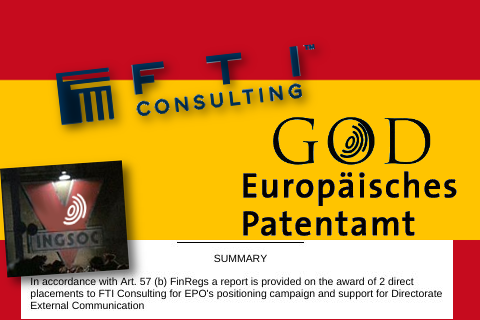
OVER the course of few recent months, the EPO's high-level management has been feeling the pinch. Managers worry because not only their staff but also the public saw some of the rot (it's really rotting inside). In the first part and second part of this short series we focused on the past of a prominent Vice-President of the EPO because there is a lasting impact right now. It is adding to the rot at the EPO. This final part will explain this critical kind of impact further down at the bottom (it's a relatively long post, but we want to end this series today in order to move on to even bigger scandals).
"Mrs. García-Escudero is therefore also Spain's main delegate to the EPO's Administrative Council."Why does it matter at all? Well, the EPO scandals are due to bad management and abusive management, it's not the fault of patent examiners, who are usually the victims and the recipients of bullying (by the management). Right now the EPO's management struggles on two fronts: one, it is unable to recruit talented people while losing existing talented people because they reportedly leave in droves; two, it is unable to attract patent applications (or applicants in general) because patent neutrality turned out to be only an illusion (if everyone applied for preferential treatment, what efficiency advantage would it bring really?) and the reputation of the EPO is in the gutter, not to mention the declining qualify of examination (because of the former point about staff leaving and no talented people being absorbed to replace them).
Now it's time to turn to the latest scandal and urge readers who have not yet read parts one and two to do so right now. It's essential reading which forms the factual basis of what we're about to show.
Recap:
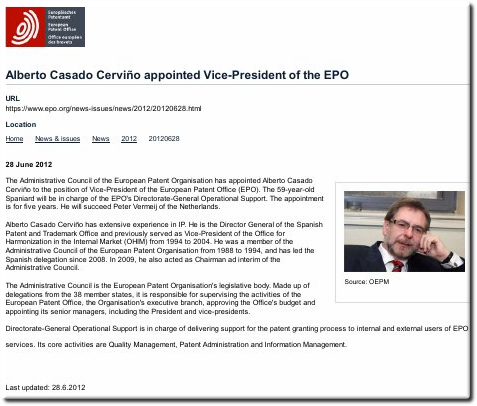
EPO press release on the nomination/appointment of Alberto Casado Cerviño as Vice-President (screenshot of the printer-friendly version of the page included so that prudent readers won't have to click on an epo.org link, risking surveillance/tracking/IP harvesting by Team Battistelli)
[PDF]. The window for applying is stated to open "quince días hábiles", i.e., 15 working days [Mon-Fri excluding holidays, according to the Spanish wiki]. We have no idea how long recruitments for official positions are usually kept opened in Spain, but this delay seems a tad short considering that it was for senior position. The relevant article states "el plazo de inscripción no finaliza hasta el próximo martes.", i.e., "the registration delay doesn't end until next Tuesday". Since the dateline was 17/11/2011, that would have been Tuesday, the 22nd of November, 2011. We've looked at a calendar, and it checks. The call for applications wasn't even half way through when Mrs. García-Escudero was appointed.
"The call for applications wasn't even half way through when Mrs. García-Escudero was appointed."This is where this story began, a blog entry published on the 13th of November, 2011.
Here is the full (original) source, a 3-page job vacancy form.
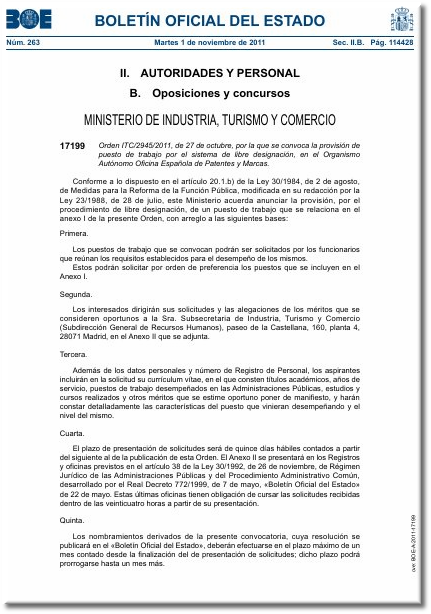
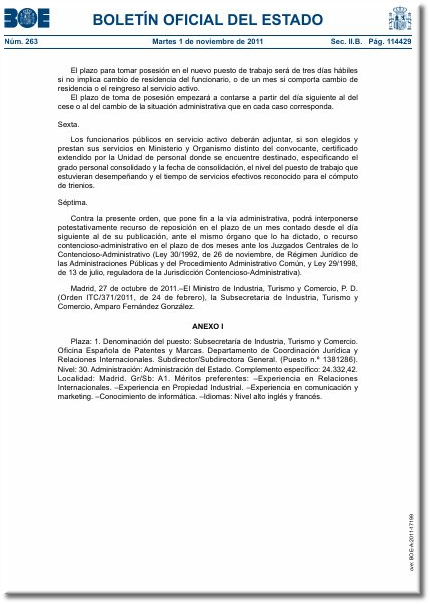
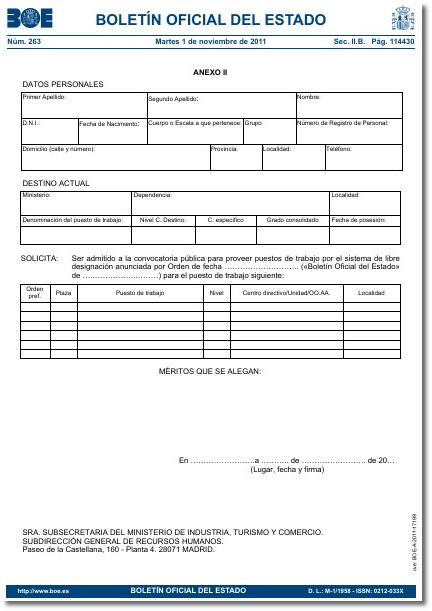
“I have noticed that this first part of the series refers to an article written at El Confidencial not too long ago.”
--AnonymousEl Confidencial, according to SUEPO, is "a highly praised Spanish media," but one of our sources disagrees. Also, a reader whom we spoke to does not quite agree. SUEPO speaks of "reports on the deteriorated social situation at European Patent Office and in particular about its authoritarian drift." While we agree with that statement/assessment, let's clarify that some are sceptical of El Confidencial, which we shall only carefully cite again in the future.
"I read on Friday your tweet about something that might be very revealing in relation to Spain/EPO," one reader told us. "I have read today the first part of the series [...] I€´m just a reader, not a journalist.
“I just wanted you to be aware that IMHO and due to the timing of the nearby general elections in Spain this (El Confidencial) might not be the ideal medium to expose in depth whatever you might have on the EPO subject if it's going to damage the reputation of the ruling party Partido Popular.”
--Anonymous"I have noticed that this first part of the series refers to an article written at El Confidencial not too long ago. I€´ll be very happy to read any scoop that comes from your research on such important matters. I just wanted you to be aware that IMHO and due to the timing of the nearby general elections in Spain this (El Confidencial) might not be the ideal medium to expose in depth whatever you might have on the EPO subject if it's going to damage the reputation of the ruling party Partido Popular.
"My purpose is to help them help you expose what you have. El Confidencial has been demonizing encryption, Tor, and any other kind of private communications since Ed Snowden came out. I wouldn€´t trust this outlet at all. I guess it€´s up to you anyway, but I thought I could somehow influence on who (medium) deals with what you and me care about."
It is for this reason that we sought the same information in other Web sites and found it as well. It's cited above. We no longer depend on just El Confidencial. Coverage about the topic was a lot broader than this, but we first found the report of El Confidencial because of another brand-new article they recently wrote about the EPO (leading to this older story, cross-referenced therein). ⬆
"You can never plan the future by the past."
--Edmund Burke